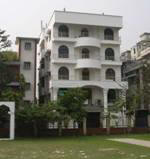 |
Bangladesh |
| |
|
 |
D.Net
(Development Research Network) |
 |
 |
| |
|
|
|
| |
D.Net (Development
Research Network) is a non-profit organization, which envisages to
use information and communication technology (ICT) for economic
development of Bangladesh. Incepted in January 2001, D.Net obtained
legal status under the Societies Act 1860 with the Registrar of
Joint Stock Companies, Bangladesh. Working with interfaces of all
development use, D.Net thrives to build up itself as a
multi-disciplinary organization.
|
|
| |
Vision A society where
information and knowledge play its designated role of facilitation
in participation of all stakeholders for generation of wealth and
its equitable distribution for poverty alleviation. Mission
To become a premier
organization in Bangladesh and beyond through undertaking research
and various programs in the areas, where information and knowledge
can contribute to poverty alleviation, economic growth and peace.
Goals
-
Knowledge generation and
sharing for broader constituency.
-
Thriving to play a
visible role in ICT and development policy.
-
Sharing Best practices in
South Asia and beyond.
Objectives
-
To work for development
of the ICT network through out Bangladesh.
-
To disseminate knowledge
among the poor and SMEs of Bangladesh for using ICT to
participate actively.
-
To work for using ICT for
agriculture, health, education, legal right, awareness building
and capacity building for development.
-
To organize different
activities to develop resource pool which can be shared over the
Internet and other ICTs.
-
To conduct action and
policy oriented research on ICT for development mainly in the
context of Bangladesh.
-
To function as an agency
for undertaking and promoting study, research and dissemination
of knowledge in development economicsand others related fields
to planning for national development and poverty alleviation
through use of ICTs.
-
To provide information
and offer advice on modern research techniques and methodology
in economics and other social sciences.
|
| |
|
| |
 |
| |
|
| |
 |
| |
|
 |
Specific
Achievements related to Bangla Localization |
 |
 |
| |
- About
30,000 page Bangla livelihood content development and
dissemination in rural Bangladesh.
- Trained
about 100 infomediaries to disseminate livelihood information.
- Developed
and maintaining 3 Bangla Websites
|
| |
|
| |
-
BORN
(Bangladesh Online Research Network) : BDResearch.org
- country's first website of its kind - is an online knowledge
center containing huge research information on Bangladesh and
many other offerings to facilitate research activity. It is
actually the official website of BORN (Bangladesh Online
Research Network) - a program initiated by D.Net -Development
Research Network.
|
| |
|
| |
-
Gunijan - Building a Proud Heritage
:
What are we
leaving as inheritance for our new generation? This is an
eternal question at all the turning points of our history. As a
nation we need sources of inspiration, which are those people
who serve our motherland with their creative mind and devotion
to ideals of peace, humanity and social justice. The "Gunijan"
initiative is for presenting through the Internet the best
products of our soil, who inspire us through their writings,
words, scientific and artistic works and other creative
pursuits. We hope that the universally accessible information on
our best people will inspire the new generations to show their
best as patriots of our motherland.
|
| |
|
| |
-
Pallitathya - Sustainable Rural Livelihood Information Network
: With the advent of information and
communication technology (ICT) revolution, there have been
numerous initiatives across the globe to use these technologies
for poverty alleviation and holistic socio-economic development.
While there have been isolated stories of innovative efforts, a
sustainable model for cost-effective use of ICTs in a rural
environment is yet to emerge. One major problem in earlier
efforts is that they have mostly not dealt with all major
components of such a model – some have emphasized too much on
establishing a “telecenter”, but not enough on the “infomediary”
(i.e. the person who works as an interface between an ICT tool
and rural end-users), while some other efforts have focused too
much on issues of connectivity, but not enough on understanding
service requirements at the rural level and developing
livelihood contents suitable for an environment, where many of
the end-users are not very educated.
|
| |
|
| |
-
Empowering People through Improved Access to Information on
Governance and Human Rights :
The access to
information on governance and human rights issues by the rural
poor has several dimensions: lack of awareness about their
rights, lack of awareness related to the role and obligations of
government institutions functioning at grass-root level, lack of
availability of information related to legal support, inadequate
legal references for legal aid, among others.
The Abolombon is designed to improve access to legal information
on governance and human rights issues for rural people using
various ICT-based channels. The scope of governance in this
project is limited within the “local governance” only.
|
| |
|
| |
Helpline - Bringing Knowledge and Information for the Poor A Call
Away :
Pallitathya Help-line is another project under Pallitathya
Programme, which provides villagers a set of mobile phone
numbers to make a specific query on any livelihood matters or to
send some urgent information to D.Net for further action. The
call is answered by a specialist at the ‘help-desk’ located at
D.Net’s headquarter. At present D.Net provides ‘help-line’
services in four villages of Nilphamari, Bagerhat, Netrokona and
Noakahli districts. There are four bare-foot women mobile-phone
operators who work as infomediary.
|
| |
|
| |
-
CLP-
Computer Literacy Program for Underprivileged Youth
:
The prime motto of the programme is
to bridge digital divide among urban and rural children and
youth in terms of computer skills. To build a knowledge society,
as announced in the national Information and Communication
Technology (ICT) Policy of Bangladesh, the country needs its
young generation to be educated and acquainted with the state of
the art knowledge of ICT. Bangladesh is trying to catch up, with
the assistance of many government and private initiatives to
make ICT work for disadvantaged people of the country. In
developing a base for skilled ICT professionals, Children and
youth in rural areas rarely get a chance to learn the use of
computers and other ICTs, and thus do not know how this modern
technology can be utilized to benefit their rural livelihood and
future career. The “Computer Literacy Program” (CLP) intended to
facilitate ace to knowledge of ICTs be the rural disadvantaged
people, particularly children and youth. More
|
| |
|
| |
-
ICT for
Human Resource Development (ICT4HRD) :
Under ICT for
Human Resource Development (ICT4HRD) program, D.Net conduct
training and other human resource development program for
different stakeholders. D.Net has conducted a course on
"e-Government and e-Commerce" for government officials. Besides
D.Net is running "Computer Literacy Program" to increase
computer literacy among under-privileged youth of rural
Bangladesh.
|
| |
|
| |
-
Research and Development :
Under
Research and Development program D.Net conduct different
research and consultancy work for promotion of different
sectors. D.Net has conducted research for government,
non-government organization, private sector, donor agencies etc.
Details of the D.Net's contribution under this program can be
found under publication button.
|
| |
|
| |
 |
| |
|
 |
Goals during Second Phase |
 |
 |
| |
- Identify
researchers for developing training modules on content
development and infomediary
- Define
specific components needed for providing training
- Develop
first draft of training modules
- Hold
workshop with expert groups for consultation
- Prepare
final draft manual for conducting training
- Use the
manual in a training
-
Incorporate lessons learnt from the training
- Produce
first version of training manual
-
Incorporate lessons learnt from refreshers training
- Develop
final manual for training
- Develop
local language content
|
| |
|
| |
 |
| |
|
 |
Project
Team Leader |
 |
 |
| |
|
|
 |
| |
|
 |
CPI Team Members and their Designations |
 |
 |
| |
- Md.
Masum Billah, Project Coordinator
|
| |
-
Majedur Rashid Jony, Project Support Executive
|
| |
-
Masudur Rahman, Researcher
|
| |
|
| |
-
Shahina Pervin, Researcher
|
| |
- Fatema
Begum Labony, Proof Reader
|
| |
- Shuvo
Ahmed, Word Processor
|
| |
|
|
| |
 |
|
|
|
| |
|


